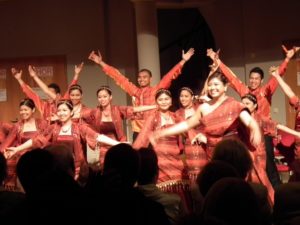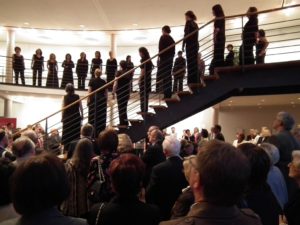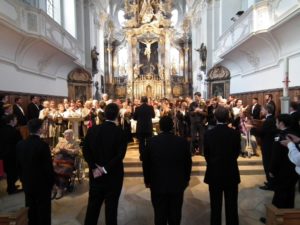Choral Enterprises
The 12th International Chamber Choir Competition Marktoberdorf 2011
By Graham Lack, Composer and ICB Consultant Editor
The cows in Germany’s Allgäu region are grey. Not black and white or ruddy brown, but slate gray – with a rosy tinge. They seem content with the view. Soon, the foothills of the Bavarian Alps can be made out, and the train pulls in to Marktoberdorf: a town that sprawls away from the station – the 1970s were a dire decade architecturally. A tapered road leads us past an outmoded pizza place, through inviting pastures and to the MODEON, a multipurpose concert hall completed in 1983 and the venue of the 12th international Chamber Choir Competition Marktoberdorf 2011.
The choirs are good box office, the long lines at the window – bafflingly named “Cash” – are evidence of this and something lost in translation. I emerged with my €18 ticket. Over five days in mid-June a dozen international ensembles gathered here to compete in song, croon on the town square, take day trips to perform on one hilly place or another, arise early for the morning sing-in and a glass or two of something, provide the music to church services over Whitsun, turn up as a flash mob to present Beethoven at the local supermarket, amuse the sponsors with special vocal events, give evening recitals, and still be fit for the odd rendition in the beer tent each night.


There were two categories in the 2011 competition: A – Mixed Choirs, and B – Female Choirs. These were, in order of appearance in the First Round: Jerusalem Academy Chamber Choir, Israel; Cantabile, Regensburg, Germany; Coro Entrevoces, Havana, Cuba; University of Louisville Cardinal Singers, USA; molto cantabile, Lucerne, Switzerland; University of the East Chorale, Manila, The Philippines; Kammerchor der Hochschule für Musik Detmold, Germany; S:t Jacobs Ungdomskör, Stockholm, Sweden (the mixed voice choirs); and (the women’s choirs) VokalArs, Madrid, Spain (with a tenor to boot); the Female Choir of Kiev Glier Institute of Music, Ukraine; Kamerkoor Cantate Venlo, The Netherlands; and the Female Choir of Estonian Choral Conductors, Tallinn, Estonia.



Standards were seriously high. Each choir sounded like a winner. And it took the compulsory work, Rhapsodia, by Joseph Gabriel Rheinberger, to help audience and jury alike form more differentiated opinions. But at the end of the long day, other factors began to play a role: such as just which pieces work best in the slightly unforgiving acoustics of the MODEON.


Some directors had made canny repertoire choice a priority and others wished to demonstrate their choirs’ inherent artistic capability, be it with early music, romantic settings or contemporary works, come what may. An attentive audience on day one paid assiduous heed to all…silentium, the mood marred only by compere Monika Schubert’s desire to get nigh on a thousand people to do morning gymnastics in the middle of the concert – well, the middle of the competition. Certainly, each choir evinced special strengths and prompted debate over coffee in the MODEON foyer. One wondered – as ever – if audience opinion chimed with the jury’s. The members were drawn from around the world too: Tigran Hekekyan (Armenia), Gudrun Schröfel (President, Germany), Jon Washburn (Canada), Martina Batič (Slovenia), Chen Yun Hung (Taiwan), Ana Maria Raga (Venezuela) and Anders Eby (Sweden).

One was spoiled for choice in the plausible intimacy of the evening, with concerts close by in churches created not out of vanity or pious fear but the craftsman’s pride: Ottobeuren, Kaufbeuren, Kempten, Altenstadt, Seeg, Nesselwang, Wildpoldsried, as well as in Marktoberdorf itself. I hitched a ride to the Basilica of St. Michael in Altenstadt: 6pm, time enough to traipse the couple of miles along a footpath for supper at an hospitable “Gaststätte”. But it was a dislocated sensation to be the only non-invited guest at the village wedding celebrations. Apropos Altenstadt, the building dates from the 12th century and has enjoyed doting restoration, its spacious but not vibrant acoustics perfect for the choirs from Jerusalem, Madrid and Stockholm. Just one full house of many.


The caesura in competition proceedings was the move from compulsory to free programmes in Round Two. Temperament and timbre ruled but did not suppress the greatest assets of each group. We witnessed then the granular sound of Jerusalem Academy Chamber Choir under Stanley Sperber, the regularity of line from Cantabile under Matthias Beckert, lively textures from Coro Entrevoces directed by Digna Guerra Ramírez, the gravitas of University of Louisville Cardinal Singers under Kent Hatteberg, smooth vocalising from Andreas Felber’s molto cantabile – nomen est omen, virtuosic declamation by University of the East Chorale under Anna Tabita Abeleda-Piquero, keen phrasing by the Kammerchor der Hochschule für Musik Detmold conducted by Anne Kohler, the vigorous attack of S:t Jacob’s Ungdomskör under Mikael Wedar, inherent nostalgia of the VokalArs sound encouraged by its director Nuria Fernández Herranz, rich textures inculcated by the Female Choir of Kiev Glier Institute of Music under Galyna Gorbatenko, pragmatic music-making by the Kammerchor Cantate Venlo conducted by Dion Ritten, and finally the earthiness of the Female Choir of Estonian Choral Conductors under Andrus Siimon and Onne-Ann Rosvee.


People streamed out to the foyer, dismissed sugar in their coffee. Jaded arguments spawned new camaraderie and reignited ancient disputes. Discussion focussed less on repertoire and style but more on presentation and the desire to hear within each work a story being told. Was this dressage with abandon or a heartfelt act?
The competition events suspended any sense of temporal juncture. Customers at the local bank were treated to the a cappella art. And there was a surprise in store, as it were, for shoppers in the “Einkaufszentrum Forum Allgäu”, stormed by a flash mob of some 400 singers. They occupied the moving staircases, leant perilously against the gallery railings, before letting loose with “Freude schöner Götter Funken”. A perplexing diversion for those buying in the fruit and veg.

The Chamber Choir Competition in Marktoberdorf goes back some twenty years, and has matured of late, its unassuming beginnings long since cloaked in a mantle of professionalism. No sooner has a concert taken place, than a recording can be acquired as a CD or DVD from the festival’s own audio-visual company, Audio•Video•Aktuell GbR. The MODEON foyer becomes a public viewing area during the concerts, so that choirs waiting to compete can catch the performances and latecomers miss little. Remote control cameras in the hall relay, somewhat unnervingly, the programmes.
The competition itself is supported by the State Ministry for Culture and Media of the Federal Government of Germany; the Bavarian State Ministry for Science, Research and the Arts; The Regional District of East Allgäu; the Town of Marktoberdorf; the German Foreign Office; the Goethe Institute; the Consortium of German Choral Associations and many others from the private and business sectors.

As Dolf Rabus, AVA Director and the Director of the Competition, put it: “Since 1989 top choirs from the German and international choral scene have met here and Marktoberdorf has become a synonym for the most demanding musical levels at international competitions, and is now a place for exchanges of expert opinion and experience, as well as advanced training”, adding that the organisation is “grateful for the generous support for decentralized cultural activities” provided by the Federal and Bavarian authorities.


At this year’s competition seven German radio stations reported on the proceedings, which included 15 concerts, four church services, two competition rounds, some 5000 visitors, 60 special guests from the world of choral music, a publishers’ exhibition of dog-eared albums, 17 CD (7 double CD) and 17 DVD commercial productions and but one world premiere, The Dancer, by Vic Nees. The local press provided a glut of coverage. Outright winners were Coro Entrevoces (1st Prize Mixed Voice Choirs and Audience Prize) and the Female Choir of Kiev Glier Institute of Music (1st Prize Female Voice Choirs). That a professional choir – from Havana – should earn the most plaudits is not surprising, they rehearse four hours each day and its salaried members are part of a choir supported by the Cuban State.


Almost a week slipped away, with music-making on the mountaintops and market-places, in the concert halls and the churches and, inexorably, in the “Festzelt”. Improvisation was in the air, and good humour. In the mêlée a rock and pop choir, Vocalive, tussled with the clamour.

The chinking of beer glasses waned: I had turned my back on the tent’s seething masses. Now to gain entry to the mysterious Hotel Sepp, an establishment ostensibly wholly lacking personnel. The Tannoy system sufficed. But in the wee hours my voice must have seemed a tad querulous: “Graham Lack here, I’m in room 74”. “So what”, came the petulant reply.

|
In Category A the prizes went to Coro Entrevoces Havanna (Achievement Level I: excellent performance at an international level, 1st Prize); University of Louisville Cardinal Singers, and S:t Jacobs Ungdomskör Stockholm (Achievement Level II: very good performance at an international level, 2nd Prize and 3rd Prize respectively); Kammerchor der Hochschule für Musik Detmold, molto cantabile Lucerne, Cantabile Regensburg, Jerusalem Academy Chamber Choir, and University of the East Chorale, Manila (Achievement Level III: good performance at an international level). In Category B the awards were as follows: Female Choir of Kiev Glier Institute of Music (Achievement Level I: excellent performance at an international level, 1st Prize); Female Choir of Estonian Choral Conductors, Tallinn (Achievement Level II: very good performance at an international level, 2nd Prize); Kamerkoor Cantate Venlo The Netherlands, and VokalArs Madrid (Achievement Level III: good performance at an international level). The Special Prizes included Best Interpretation of a Religious Choral Work (University of Louisville Cardinal Singers, for Salve Regina by Herbert Howells); Pro Musica Viva Maria Strecker Daelen Conductor’s Prize for the Best Interpretation of a Contemporary Choral Work (Mikael Wedar, S:t Jacobs Ungdomskör, for We Know Not Where the Dragons Fly by Mattias Sköld), Walter & Charlotte Hamel Foundation Hanover Prize for the Best Interpretation of a Romantic Choral Work for Female Choir (Female Choir of Kiev Glier Institute of Music, for Sergey Taneyev’s Adeli), Special Prize of the Carl Orff Foundation Diessen am Ammersee for the Best Interpretation of a Choral Work Premiered at the 2011 Competition (Kamerkoor Cantate Venlo, for one of a kind, The Dancer by Vic Nees). The Audience Prize went to Coro Entrevoces. |